 MyDogBreeds
MyDogBreeds Treeing Cur is originated from United States but Curly Coated Retriever is originated from United Kingdom. Treeing Cur may grow 8 cm / 3 inches shorter than Curly Coated Retriever. Treeing Cur may weigh 13 kg / 28 pounds lesser than Curly Coated Retriever. Both Treeing Cur and Curly Coated Retriever has almost same life span. Treeing Cur may have less litter size than Curly Coated Retriever. Both Treeing Cur and Curly Coated Retriever requires Low maintenance.
Treeing Cur is originated from United States but Curly Coated Retriever is originated from United Kingdom. Treeing Cur may grow 8 cm / 3 inches shorter than Curly Coated Retriever. Treeing Cur may weigh 13 kg / 28 pounds lesser than Curly Coated Retriever. Both Treeing Cur and Curly Coated Retriever has almost same life span. Treeing Cur may have less litter size than Curly Coated Retriever. Both Treeing Cur and Curly Coated Retriever requires Low maintenance.
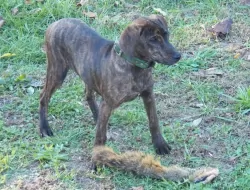 The Treeing Cur dog is a mixed-breed, working dog which hails from the USA and recognized by the United Kennel Club in November 1998.
The Treeing Cur dog is a mixed-breed, working dog which hails from the USA and recognized by the United Kennel Club in November 1998.
They’ve always been used to tree animals such as squirrels, raccoons, bears, and even mountain lions. They were developed to be used as hunting and guarding dogs.
Aside from these good qualities, today the dog makes an excellent family companion.
 There isn’t much on the origin of the Curly-Coated Retriever and his history hasn’t been well documented.
There isn’t much on the origin of the Curly-Coated Retriever and his history hasn’t been well documented.
The dog originated some time ago in the early 19th century, with some believing that the dog was in England during the late 1700s already.
It is thought that this dog, which is identical to the Labrador but with a tight, curly coat, descended from the Old English Water Dog, the Irish Water Spaniel and the smaller Newfoundland. This mix was later crossed with the Poodle and this is where the curls come into the picture.
The Curly-Coated Retriever gained substantial recognition in England during the mid-1800s and exported to the United States in 1907. The dog was also later exported to Australia and New Zealand and has been recognized by the American Kennel Club in 1924.
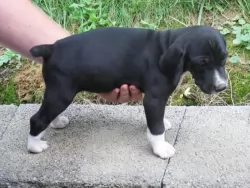 Standing at between 46 – 61cm in height and weighing between 14 – 27kg, the medium-sized Treeing Cur is athletic and muscular.
Standing at between 46 – 61cm in height and weighing between 14 – 27kg, the medium-sized Treeing Cur is athletic and muscular.
He has a short to medium-length double coat that can be in a number of colors. Red and white, tan and white, black and white, brindle, some freckling and bi-colored or tri-colored.
The eyes are mostly brown but can be green or blue too. They’re well-muscled and robust and have medium length floppy ears. The tail is mostly docked but is sometimes left long.
These dogs are alert and intelligent, being easy to train and wanting to please their owners, getting along well with all members of the family, including children and other dogs.
They’re strong-willed dogs and will require training and socialization if you want them to be well behaved wherever they are. He is intelligent so there won’t be any trouble with training him. He is very responsive to what his owner requires of him, with a desire to make their owners pleased with them.
 The Curly Coated Retriever is a medium sized dog standing at about 58–69cm and weighing anything between 25 – 40kg. The dog, mainly black or chocolate brown, is active and muscled and was used for hunting and retrieving waterfowl.
The Curly Coated Retriever is a medium sized dog standing at about 58–69cm and weighing anything between 25 – 40kg. The dog, mainly black or chocolate brown, is active and muscled and was used for hunting and retrieving waterfowl.
The coat has small, tight curls over the body except for the face and the legs. He has floppy ears and they eyes of the black dog are brown while in the liver-colored dogs, the eyes are amber or gold.
The tail is long. He has a wedge shaped head, and its the fact that the face is more long than wide which makes him easily distinguishable from other retriever breeds. Of course, it is the curly coat which is the dog’s most distinguishing feature.
The Curly Coated Retriever has been used as a gun dog, and today, like most retrievers, they make superb pets and are a lively, social and fun-loving breed. He becomes loyal and devoted to his human family members, making a splendid pet, but then he must be exercised.
Have him trained and socialized and he becomes an obedient, relaxed dog, eager to please. He is intelligent and self-confident and gets on well with children in the home as well as with other pets.
He fits in easily to city and country life, but if he could have large grounds to run, play and swim, which he loves, he would be at his happiest.
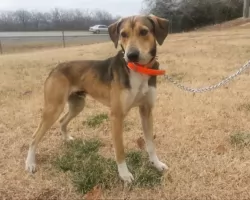 The Treeing Cur is a working dog that loves all the action. He is an alert, intelligent dog, and being territorial and protective, he makes an excellent guardian dog too.
The Treeing Cur is a working dog that loves all the action. He is an alert, intelligent dog, and being territorial and protective, he makes an excellent guardian dog too.
They can show some aggression towards strangers and other dogs they don’t know. Apart from being an excellent hunting dog, the Treeing Cur loves to be around their human family, making loyal and loving companions.
 Curly Coated Retrievers are such fun dogs, full of personality, robust and active. He makes such a wonderful pet and is loving, loyal and protective. He is brave, courageous, independent and confident as well. He gets on well with children and loves to be part of all their games. He is capable of getting on well with other animals in the home.
Curly Coated Retrievers are such fun dogs, full of personality, robust and active. He makes such a wonderful pet and is loving, loyal and protective. He is brave, courageous, independent and confident as well. He gets on well with children and loves to be part of all their games. He is capable of getting on well with other animals in the home.
He is an active dog and won’t fit in well with those who like to sit around all day. He wants to be active, and then loves to settle down with his human family at night. He is an excellent all-rounder and makes a loving, loyal pet.
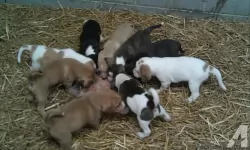 These dogs are very healthy and you’re not likely to have many vet bills when you bring one into your home.
These dogs are very healthy and you’re not likely to have many vet bills when you bring one into your home.
The Treeing Cur has floppy ears, and particularly if it's a dog that loves swimming, it will battle with moisture in the ears. Dogs with floppy ears don’t have good air-flow inside the ears like a dog with erect ears would have. This means that the dog is prone to ear infections.
This is such a common dog illness that can strike even young dogs. That is why it is important to check your dog over regularly for lumps and bumps on the body. Age increases the risk of cancer, so if you feel an unusual lump on your Treeing Cur, better to have your dog checked out at the vet.
 With good care, the average life expectancy of the Curly-Coated Retriever can reach between 10 and 12 years. However, there are some health concerns that your dog may have to contend with and which are common in most other dog breeds too.
With good care, the average life expectancy of the Curly-Coated Retriever can reach between 10 and 12 years. However, there are some health concerns that your dog may have to contend with and which are common in most other dog breeds too.
Apart from hip dysplasia, bloat, dental decay and eye diseases such as cataracts, ear infections are a common canine health problem, particular when your dog has floppy ears and loves the water.
Ear infections can also be caused because of bacteria, ear mites, allergies and hair growth in the ear canal. Your pet will shake his head, maybe off balance and be scratching his ear. You might notice his ears are red and oozing. Get him to the vet immediately.
When you brush your dog, check for fleas and ticks. Worms too, can make your dog ill, and can actually be the death of a puppy. Worms can cause weight loss, a rough, dull coat and a generally run-down appearance. Your vet will be able to guide you as to what medications are available.
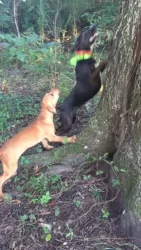 Being an energetic working dog, this dog isn’t going to be content to be lying around. He is going to need regular exercise. He loves a brisk walk or even a run next to you when you go cycling.
Being an energetic working dog, this dog isn’t going to be content to be lying around. He is going to need regular exercise. He loves a brisk walk or even a run next to you when you go cycling.
When at home, you can consider ball games and hide and seek games with him. They just love to run, and if you live near a park, he will want to be off the leash if possible for some free running and sniffing around.
The short coat of the Treeing Cur will do well with a brush twice a week. While you brush your dog, check him out for ticks and fleas. Also, check him over for any unusual lumps.
Part of his grooming should be to check inside his ears for signs of redness, to make sure his eyes are nice and bright still and to see if he will let you look inside his mouth for bad teeth. Bad teeth can be a source of pain for him.
Caring for your Treeing Cur in a responsible manner means ensuring good food. Such an active dog will require proper nutrients so as to meet his energy and health needs.
Your Treeing Cur will need a high-quality commercially manufactured dog food for active dogs and they will also benefit from other simple cooked foods such as boiled chicken, brown rice and vegetables. The habit of feeding your Treeing Cur human foods such as chocolates, popcorn, peanuts, onions and spices could cause digestive upsets and possible vet fees.
 The Curly Coated Retriever is a single-coated dog breed and this makes him a low maintenance dog. He doesn’t shed much and a good brush twice a week will keep the curly coat in good condition. There are some dog owners that trim the feathering around the legs, feet, tail and belly.
The Curly Coated Retriever is a single-coated dog breed and this makes him a low maintenance dog. He doesn’t shed much and a good brush twice a week will keep the curly coat in good condition. There are some dog owners that trim the feathering around the legs, feet, tail and belly.
The Curly Coated Retriever is an attractively low maintenance breed. Therefore he doesn’t require any special diet. He does well on a top quality manufactured dog food where protein is listed at the top.
These dogs are inclined to put on weight easily so you want to be sure to follow the directions on the packaging and not overfeed him. With his kibble, sometimes add in some cooked brown rice, vegetables and chicken.
Raw meat can be expensive but if you can, try and include it into your pet’s diet to avoid nasty skin rashes and allergies. Always make sure that cool, fresh water is available to your dog and make sure the food and water bowls are regularly washed.